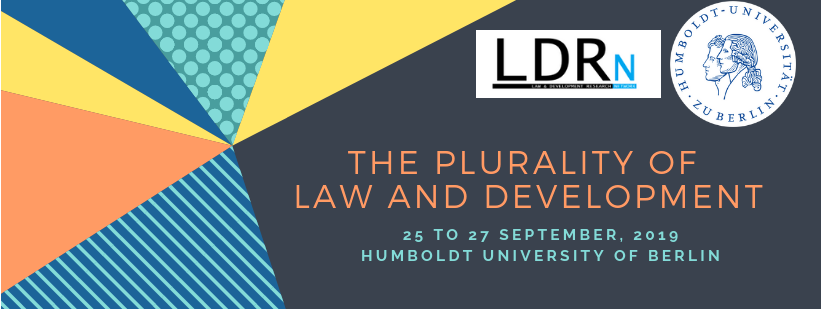This short note was inspired by the 2019 Law and Development Research Network Conference in Berlin. The Conference was organised by the Chair for Public Law and Comparative Law at Humboldt University, and was attended by over two hundred scholars from thirty-nine countries under the heading ‘The plurality of law and development’. I am greatly indebted to those who offered their views at the conference; what follows, however, is a personal reflection, and an invitation to continue the conversation.
As the vibrant Berlin Conference testified, reports on the death of law and development as a field of inquiry were greatly exaggerated. The field has a future. But it also has a past: of colonialism, of aid conditionalities, of law reform interventions by hegemonic countries and global institutions, of facilitating global inequality and injustice. The legitimacy of law and development as an on-going scholarly venture hinges on not replicating injurious past practices.
This can be done, but it requires scholarly self-awareness rather than estrangement, and a conscious self-critical effort.
In my view, law and development has a future if it is understood as an equal exchange of knowledge between scholars in the Global South and the Global North on how law impacts on societies in the Global South, as well as on marginalized communities in the North.
An equal exchange requires a bi-directional flow of knowledge, and a platform that is horizontal rather than hierarchical. It means unlocking the knowledge generated in the Global South. This will require revising international publication practices so that knowledge produced in the Global South becomes as accessible and influential as knowledge produced in the North. It also implies enhancing the capacity of non-mainstream universities in the Global South.
As a research community, law and development scholars can strengthen or create networks, universities and law faculties in South and North that welcome diversity of scholarship, where historically subordinated voices can be heard loud and clear, and where it is safe to express difference of opinion. As a community, we also have a responsibility to defend academic freedom and to protect the safety of researchers that engage in free research.
Both ‘development’ and ‘law’ are contested concepts, but at least at this point in time, they may still serve as vehicles for a global dialogue if they are defined in an inclusive way: ‘development’ as including economic well-being, ecological sustainability and social justice; and ‘law’ as referring not only to State-made law, but to law produced by a variety of actors at various levels.
Cooperative North/South law and development research can critically analyse how law is made, and what factors determine the impact law has on society, and particularly on marginalized groups. Such an inquiry necessarily implies an engagement with perspectives from other disciplines.
The question of whether the findings of such research should lead to law reform is, in my view, primarily a question of popular sovereignty, and thus a matter to be decided upon by the society or societies concerned.
Finally, law and development scholars are well advised to consciously situate themselves within the field. For example, I am a senior male white scholar, and a national of a former colonial power. This profile determines the position from which I start in engaging with scholars in less privileged positions. In an equal global exchange of knowledge unequal starting positions threaten equality, and need to be handled with self-awareness and care.
Koen de Feyter is full-time Professor of International Law at the University of Antwerp and part-time Professor at PILC and the University of Maastricht and part of the Research Group on Law and Development of the University of Antwerp.
Cite as: Koen De Feyter, “The new wave of law and development”, Völkerrechtsblog, 15 October 2019, doi: 10.17176/20191015-112610-0.

Brilliant ideas. Well done!
John Kigula